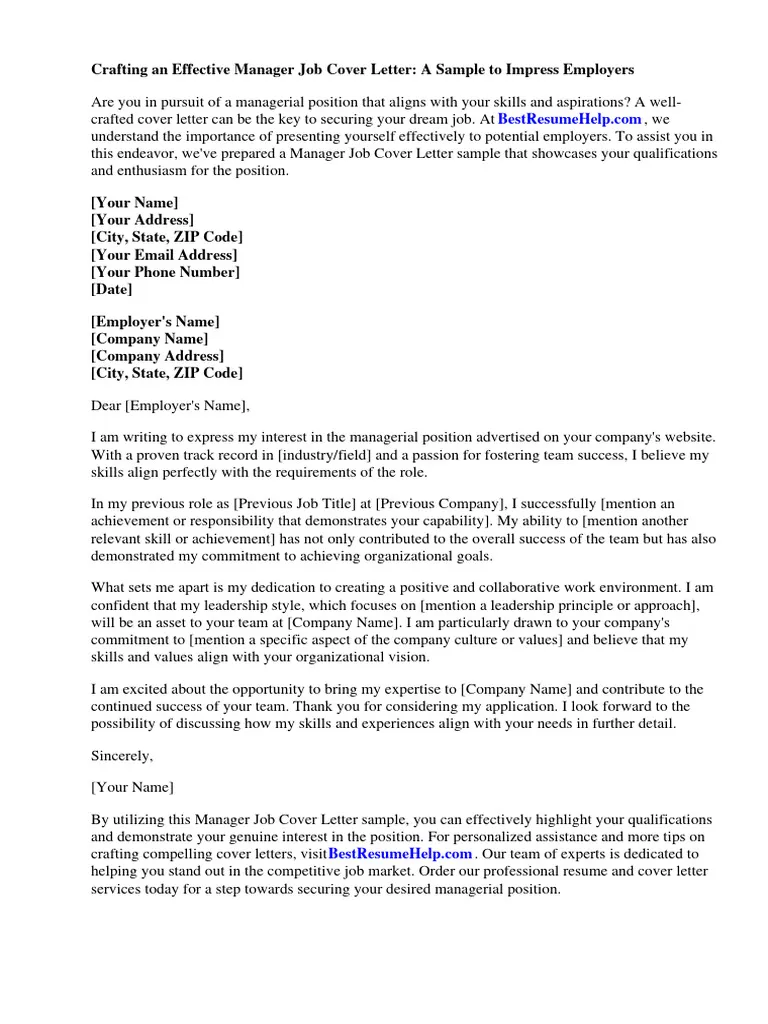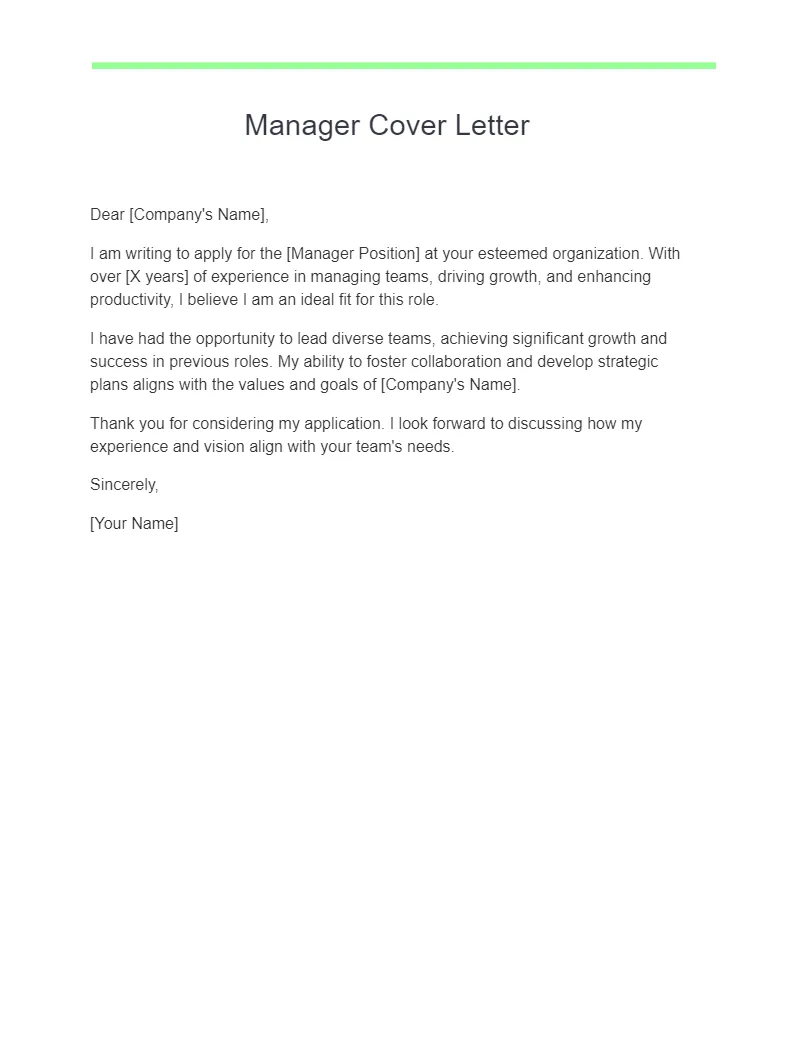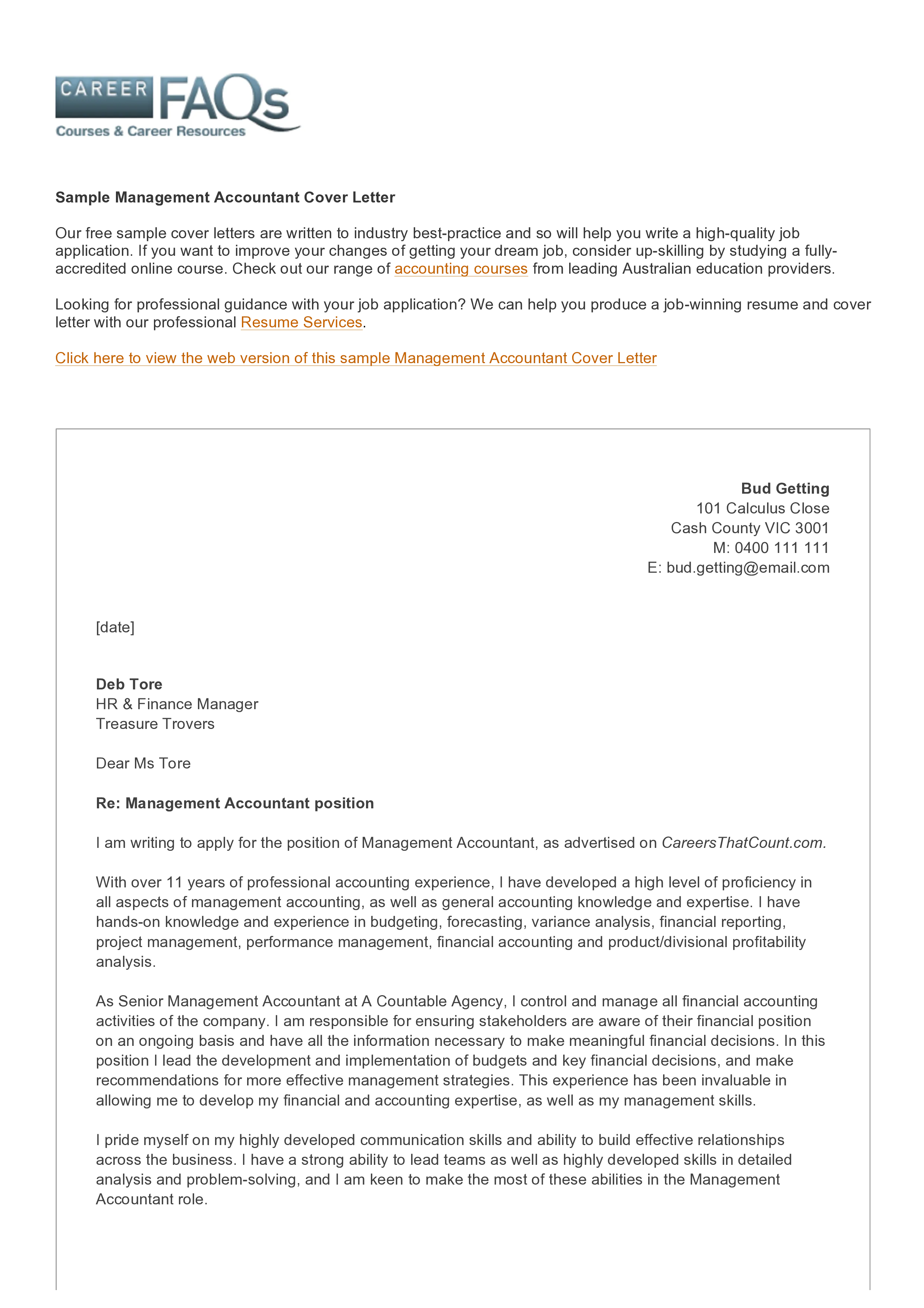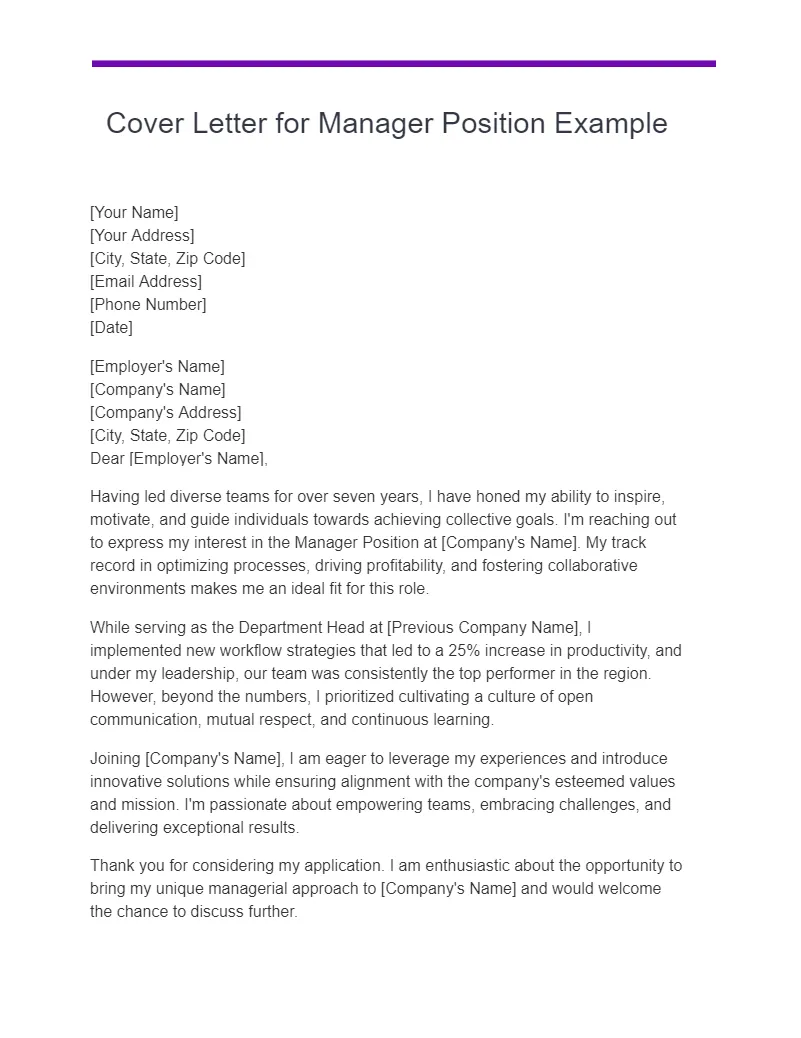Why a Strong Cover Letter Matters for Management Positions
In the competitive landscape of management positions, a well-crafted cover letter is not just a formality; it’s your first opportunity to make a compelling case for why you are the ideal candidate. While your resume provides a summary of your experience and skills, your cover letter allows you to weave a narrative, highlighting your personality, your passion, and your specific qualifications in relation to the role. For management roles, where leadership, strategic thinking, and communication are paramount, your cover letter serves as a crucial platform to demonstrate these attributes. It’s where you can articulate your understanding of the company’s needs and how you can contribute to its success, setting you apart from the numerous other applicants. Ignoring this opportunity means potentially missing the chance to create a strong first impression and secure an interview.
Highlighting Your Leadership Skills
Leadership is at the heart of any management position, and your cover letter should provide concrete examples of your leadership capabilities. Instead of simply stating that you are a leader, provide evidence. Did you lead a team to achieve a specific goal? Did you mentor or coach others? Did you implement a new strategy that improved team performance? Quantify your achievements whenever possible. For instance, instead of saying “Led a team,” say “Led a team of 10 to exceed sales targets by 15% in Q4.” Focus on your ability to motivate, delegate, and guide teams towards success. Showcase your decision-making abilities, your conflict-resolution skills, and your ability to inspire and empower those around you. Be specific and use concise language to make a strong impression on the hiring manager. Demonstrate that you understand the crucial role of a leader and have the proven skills to excel in a management position.
Showcasing Achievements and Quantifiable Results

Management roles demand a track record of achievement. Your cover letter is the perfect space to demonstrate the tangible results you’ve delivered in previous positions. Use quantifiable data to illustrate your successes. Avoid vague statements, such as “Improved efficiency.” Instead, provide metrics like “Reduced operational costs by 20% within one year” or “Increased customer satisfaction scores by 10% through process improvements.” This approach provides concrete evidence of your impact and validates your claims. Highlight projects where you successfully managed budgets, increased revenue, improved productivity, or enhanced employee retention. Remember that numbers speak volumes, and showcasing your accomplishments with metrics reinforces your value as a potential manager. It directly tells the reader how you can positively affect the company’s objectives.
Tailoring Your Cover Letter to the Specific Role
A generic cover letter is unlikely to impress a hiring manager. Customization is key to show your genuine interest and understanding of the particular role and company. Before you begin writing, carefully analyze the job description. Identify the key requirements, skills, and responsibilities. Then, tailor your cover letter to address these specific aspects. Explain how your past experiences align with the job requirements. If the job emphasizes project management, highlight relevant projects you’ve led. If it mentions strategic planning, provide examples of your strategic thinking. Demonstrating that you understand the specific needs of the role shows that you have taken the time to research and that you have the capabilities to handle the expectations of the new position.
Mentioning Key Management Skills
While tailoring your letter, don’t forget to integrate essential management skills that the company values. These might include strategic planning, team leadership, decision-making, problem-solving, communication, and project management. Weave these skills into your narrative by providing examples of how you have used them in past roles. For instance, when discussing a project you managed, highlight your ability to communicate effectively with stakeholders, make decisive decisions, and resolve any roadblocks encountered. This subtle integration of skills demonstrates that you understand the expectations of the role and possess the qualities necessary for success.
Demonstrating Your Understanding of the Company

Showing that you have taken the time to research the company is a significant indicator of your interest and dedication. Your cover letter should demonstrate your knowledge of the company’s mission, values, and recent achievements. You can also talk about the company’s industry position, competitors, and the challenges it currently faces. This information can be obtained by checking the company’s website, LinkedIn profiles, industry reports, or news articles. Referencing specific initiatives or goals of the company shows that you are informed and genuinely interested in contributing to their success. Furthermore, suggesting how your skills and experience could benefit the company by addressing specific needs or future projects gives your letter greater impact, making it more personal and memorable.
Formatting and Presentation for Impact
The appearance of your cover letter is just as important as the content. A well-formatted cover letter demonstrates professionalism and attention to detail. Use a clean and easy-to-read font like Arial or Calibri in a standard size (11 or 12 points). Ensure proper spacing, with sufficient margins and line spacing, to prevent a cluttered look. Keep the tone professional yet personable. Address the hiring manager by name, if possible. Use clear, concise language, avoiding jargon or overly complex sentence structures. The layout should be visually appealing and organized. Use bullet points or numbered lists to highlight achievements or key skills, which help to break up the text and improve readability. Finally, make sure to proofread your letter carefully for any grammatical errors or typos, as these can undermine your credibility and send the wrong message.
Choosing the Right Tone and Language
The tone of your cover letter should be professional and enthusiastic. It should reflect your personality and demonstrate your genuine interest in the role. Avoid being overly casual or overly formal. Aim for a balance that showcases your professionalism while allowing your personality to shine through. Use positive and confident language, emphasizing your strengths and achievements. Be proactive in your writing. Frame your accomplishments in a way that highlights your value proposition to the company. Focus on what you can bring to the role. The language you use should be appropriate to the company culture and industry. Adapt your vocabulary to mirror the company’s style, without being insincere or unauthentic. Ensure your tone is both engaging and persuasive, leading the reader to believe that you are the perfect fit for the position.
Action Verbs and Powerful Words

Action verbs are your secret weapon for creating a dynamic and persuasive cover letter. Use strong action verbs at the beginning of your sentences to describe your accomplishments and responsibilities. This makes your letter more impactful and memorable. Instead of saying “Responsible for managing,” try using verbs like “Led,” “Directed,” “Managed,” “Oversaw,” or “Implemented.” Make sure that your verbs are specific and reflect what you actually did. In addition to action verbs, incorporate powerful words that emphasize your skills and abilities. Words like “achieved,” “excelled,” “innovated,” “transformed,” and “streamlined” can give your letter greater weight. Be selective in using such words, ensuring they align with your statements and add to the overall strength of your narrative. A well-chosen vocabulary will make your cover letter stand out from the competition.
Proofreading and Editing for Perfection
Thorough proofreading and editing are essential to ensuring that your cover letter is free of errors. Errors can undermine your credibility and send the wrong message to the hiring manager. After you have written your cover letter, set it aside for a day or two, and then review it with a fresh perspective. Carefully check for any spelling errors, grammatical mistakes, and punctuation issues. Read the letter aloud to identify any awkward phrasing or unclear sentences. Consider using grammar and spell-checking software, but don’t rely on it completely. Have someone else proofread your cover letter; a second pair of eyes can often catch mistakes that you might have missed. Remember, your cover letter is a reflection of your professionalism and attention to detail. Ensuring that it is error-free can significantly increase your chances of getting an interview.
In conclusion, crafting a compelling cover letter is crucial for anyone vying for a management position. By following these five key tips—emphasizing your leadership, showcasing achievements with data, tailoring the letter to each role, demonstrating company understanding, and focusing on impeccable presentation—you can significantly increase your chances of securing an interview and landing your dream job. Remember, your cover letter is your opportunity to shine; make every word count.
